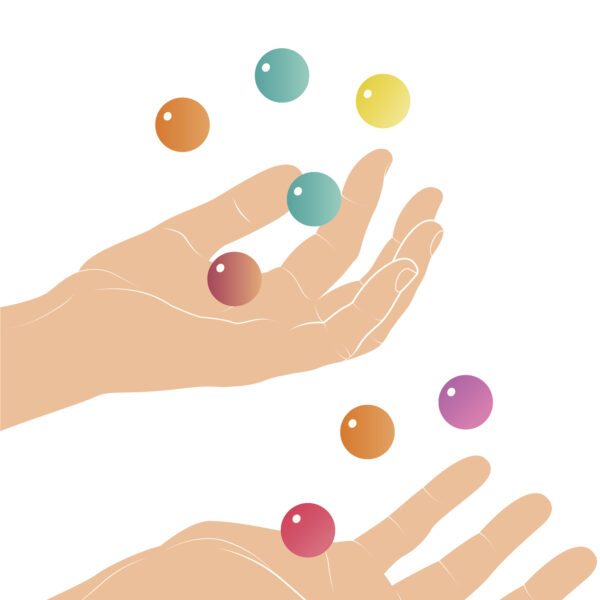Years ago, someone shared a metaphor with me about juggling priorities. It goes like this: Some of the things we juggle are rubber balls — if we drop them, it’s not the end of the world. Other things are crystal balls, which will shatter if we drop them.
When I first heard this metaphor, I was at a point in my life where I was juggling a lot of things. I was a single parent to two elementary-school-aged children, working a full-time job while also teaching part-time, and attending graduate school online. And those were just the big things. I was also responsible for taking care of my house, cat, and guinea pig, performing in burlesque shows, going hiking with friends, and more. To say that there were a lot of balls in the air would be an understatement.
At that time, it was relatively easy for me to distinguish between the crystal and rubber balls in my life. I knew that I had to prioritize feeding my children and taking care of my pets, but the dishes could wait until after I finished the essay for grad school. I became quite skilled at juggling my responsibilities, and on the rare occasion that a ball was dropped, I made sure it was a rubber one.
More Balls, New Circus
When I began dealing with symptoms of chronic illness, it felt like new balls were being thrown into my juggling routine faster than I could adjust to or keep up with. Along with my previous responsibilities, I now had to attend doctor’s appointments, manage medications, and prioritize essential naps. Things that I once considered crystal balls, like work, were dropped as I began to re-evaluate and understand the true priorities in my life.
Rather than prancing around like a circus clown with numerous colorful balls suspended in the air as I magically juggled them, I now found myself lying in bed, struggling to keep just a few balls in the air.
It all just felt like too much.
To be fair, it was too much.
I realized that something had to give, something needed to change. Living with chronic illness and disability is all about learning to adapt, and this situation was no exception. My capacity was now limited, and my priorities needed to reflect that.
4 Lessons Learned: Tips for Managing Chronic Illness
Through my experiences, I have learned several things that have helped me to better manage my chronically ill life — and I hope they can help you too.
Don’t try to juggle everything.
It can be tempting to try to keep doing everything you were doing before becoming ill. I used to think of myself as SuperWoman, so why couldn’t I continue to be one? But the truth is, my SuperWoman complex and pushing myself to do everything all the time probably contributed to my symptoms. Whether you have a healthy, able body or one with chronic conditions and disabilities, your body needs rest. It’s not sustainable to constantly try to juggle everything. Eventually, it will all come crashing down.
Sometimes, you just need to set the balls aside and take a much-needed nap. I’ve had to learn to say “no” to taking on additional responsibilities and become comfortable with informing people that I can’t do certain things I previously agreed to. I’ve also learned to internally accept that my house won’t always be spotless and that my children may have cereal for dinner instead of a meal complete with all food groups.
Ask for help.
I’ve also come to realize that we were never meant to juggle all these things on our own. Our friends, family, and various communities (whether social, faith-based, identity-based, or otherwise) want to be there for us. I’ve found that people are eager to help me. Instead of being a burden, which is what I’ve always worried about, they see it as a blessing to be able to help someone they care about.
So, let the people in your life take some of those balls from you and help out, or let them help you get things back on track when you inevitably drop a ball. It’s okay to ask for help and to accept it when it’s offered. In fact, it can be a relief for both you and the person helping.
Remember, we all need support at some point in our lives, and it’s okay to lean on others when we need to.
Accept that you will sometimes drop the ball.
It’s normal and human to do so, especially for those of us living with chronic health issues. Our lives can be unpredictable, and our abilities to follow through on plans or deadlines can be affected by our symptoms or unexpected emergencies. There have been many times I’ve had to postpone or reschedule plans with a friend or extend work deadline due to my chronic illness. Practicing radical acceptance of both our humanity and our disability can help us be gentler with ourselves when these things happen.
The most important crystal ball is you.
The main thing I’ve learned: While there are certainly important things that need to be done, the most important crystal ball is myself. Taking care of myself should always be the top priority, as without my own health and well-being, none of the other things in life will matter. I can always figure out a way to get help with bills or have my children heat up leftovers but neglecting my own needs will only lead to further health issues. In the art of juggling a chronically ill life, taking care of myself is the most important ball to keep in the air.
Be a More Proactive Patient with ArthritisPower
Join CreakyJoints’ patient-centered research registry to track your symptoms, disease activity, and medications — and share with your doctor. Sign up.






